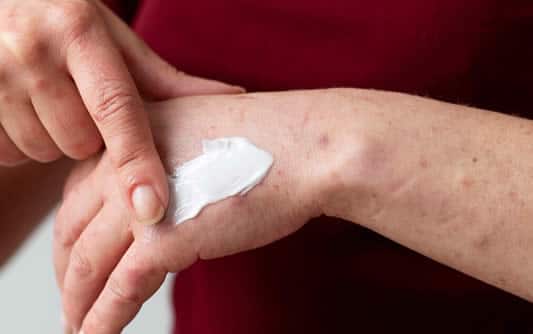Treating Eczema Flare-Ups
Work with your doctor to find the right treatments for you. Your symptoms, age, family history, other health problems, and lifestyle help you find treatments that work. Most eczema treatments give you short-term relief. Your doctor can prescribe a steroid cream to stop the itch and clear your rash, or topical creams called calcineurin inhibitors like pimecrolimus (Elidel) or tacrolimus (Protopic) that protect your skin and prevent eczema outbreaks. Hydrocortisone cream is available over the counter (OTC) and eases mild itching. Eucrisa ointment is a nonsteroidal anti-inflammatory topical treatment that may help reduce redness and itchiness in mild to moderate atopic dermatitis. For a severe outbreak, apply steroid cream and then wrap a wet bandage around the area to keep it moist. Light therapy from the sun or with a UV ray device at your doctor’s office may ease outbreaks, too. For strong eczema itching that keeps you up at night, try oral antihistamines. Diphenhydramine can stop itching and help you sleep. Cetirizine, fexofenadine, and other antihistamines can ease flares and itching but don’t make you drowsy. They’re all available OTC. Your doctor may also prescribe oral corticosteroids or give you a steroid shot for a strong eczema flare. If you scratch your itchy rash and break the skin, you might need antibiotics to prevent an infection. For moderate to severe eczema that is not controlled by topical medications, or when topical medicines cannot be used, dupilumab (Dupixent) or tralokinumab (Adbry), both injectables, may be prescribed. These drugs are given every few weeks as shots under the skin. Another medication, upadacitinib (Rinvoq), is a pill taken once daily that helps reduce itchiness quickly. Work with your doctor to treat your eczema. Some drugs or remedies for eczema, like steroids, can cause side effects if you use them too long or too often.
Prevent Flares, Feel Better
Many things could set off an eczema flare. You may not have the same triggers as someone else. It pays to figure out what causes your skin to react.
Dry skin
If your skin gets too dry, it can become rough and itchy. It might even crack. That can let bacteria or allergens inside. Dry skin is a common eczema trigger for many people. Extreme changes in temperature can stress your skin, too. Tips: Keep your skin moist — especially in winter, when the air can be very dry. Use a humidifier to moisten the air in your bedroom when you sleep. Apply cream or ointment after you get out of a shower or bath. Soak in a warm bath with small amounts of bath oil, or add colloidal oatmeal to ease eczema itching and moisten your skin. See what’s the best lotion for eczema.
Irritants
Products you use every day may bother your skin. Soap, cleansers, body wash, laundry detergent, lotions, or even some foods you touch can trigger eczema rashes. Tips: Talk to your doctor to pinpoint what may irritate your skin. They can test how your skin reacts to certain products. Keep track of anything you use that seems to trigger a flare after you touch it. Choose soaps, cleansers, and laundry detergents without added perfumes or dyes. These are common eczema triggers.
Clothing
Fabrics that are rough, too tight, or itchy can trigger eczema. Clothes that are too warm or heavy can make you sweat and cause a flare, too. Tips: Opt for soft clothes that are gentle on your skin and keep it cool. If wool or other fabrics seem to bother you, don’t wear them. Find wool-free garments to keep you warm in winter. Wear loose items that don’t rub against your skin.
Dust, smoke, pet dander, and sand
Tiny particles in the air can cause a rash or irritate your skin. You might be allergic to pet dander from cats or dogs. Maybe cigarette smoke or a dusty house is to blame. Tips: Keep your home or office area clean. Dust often. Don’t smoke or hang out with people who do. If you think you’re allergic to pet hair or dander, talk to your doctor or see an allergist, a doctor who specializes in treating allergies.
Stress and anxiety
Worry can make your eczema flare up. Plus, itchy, sore skin can also stress you out. It can be an endless cycle if you don’t break it. Tips: Find ways to relax in times of stress. Make sure you get enough sleep at night so you feel refreshed the next day. Aromatherapy, massage therapy, and soaks in a warm bath may help you ease tension. Get help if you can’t keep your stress under control.

